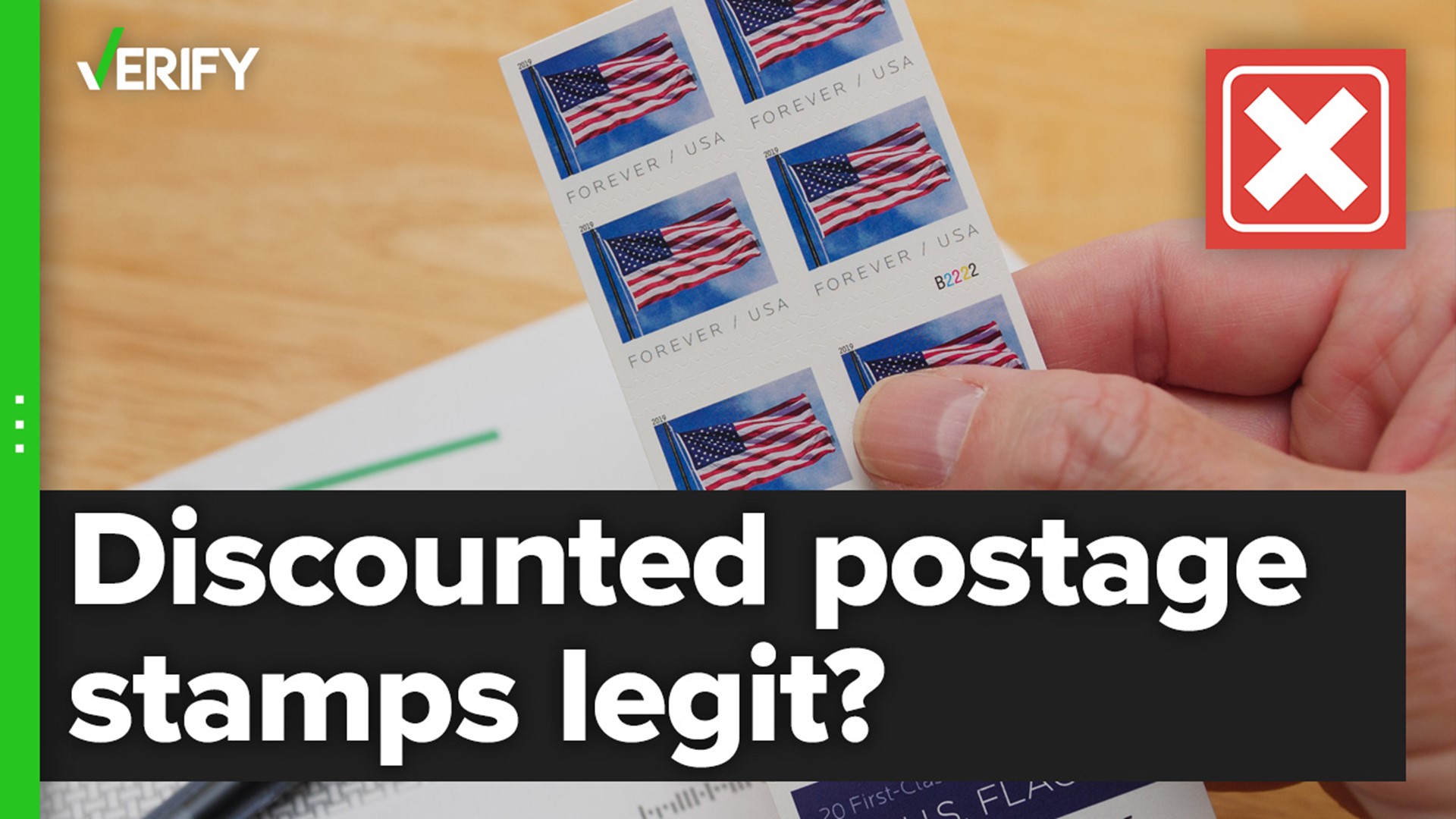If you see a product being sold online for a big discount, you may wonder if the advertised deal is too good to be true.
That was the case for two VERIFY readers who asked the team about discounted postage stamps sold online, as people throughout the country are mailing holiday cards.
Emerson sent the team an email with a website selling 100 forever stamps for $29.99, or approximately 29 cents each, 31 cents less than the price at the post office. They asked if websites selling discounted stamps are legitimate.
THE QUESTION
Are most postage stamps being sold at a major discount real?
THE SOURCES
- United States Postal Inspection Service (USPIS), the law enforcement arm of USPS
- AARP
- Better Business Bureau (BBB)
THE ANSWER
No, most postage stamps being sold at a major discount aren’t real.
The law enforcement arm of USPS warns that a “significant discount” is a sign of a counterfeit stamp scam.
WHAT WE FOUND
While it’s common to be on the lookout for deals during the holiday season, the United States Postal Inspection Service (USPIS) warns people to remember the old adage: “If it seems too good to be true, it probably is.”
USPIS confirmed that scam sites are selling fake stamps and looking to take advantage of online bargain hunters.
In a notice posted to its website, USPIS says “the number of counterfeit stamps being sold from online platforms has escalated.”
A spokesperson for the Better Business Bureau (BBB) told VERIFY it has received 156 scam tracker reports for stamps.
Some of these scammers advertise discounts of 20% to 50% on stamps, especially those sold in bulk, through social media marketplaces or other websites, USPIS says.
“A significant discount is a tell-tale sign the postage stamps are counterfeit,” a spokesperson for USPIS said in an email.
More from VERIFY: Yes, scam text messages impersonating the United States Postal Service are circulating
But apart from a suspiciously low price, the average consumer won’t be able to identify a fake stamp, USPIS said in a YouTube video. VERIFY asked USPIS how people could identify counterfeit stamps if they may have fallen victim to a scammer, but the agency said “features on the stamp remain proprietary and will not be disclosed.”
In reports to the BBB, some people reported receiving counterfeit stamps that looked different than what was advertised online or having mail declined by the post office because the postage was fraudulent.
USPIS officials warned people about counterfeit postage stamps during the 2021 holiday season, too. Andrea Avery, an assistant inspector in charge at the USPIS, told AARP last year that she saw many fake stamp websites on Facebook. AARP also reported that counterfeit stamps are sold on eBay and illicit websites.
More from VERIFY: Watch out for these common holiday scams
USPIS says a counterfeit stamp that people often come across is the flag stamp, or the forever stamp that features an image of the American flag.
The website that Emerson sent to VERIFY is selling flag stamps for about 29 cents each versus the current stamp price of 60 cents each, a discount of nearly 50%. When VERIFY tried to call a phone number associated with the website, we were met with a vulgar voicemail rather than information about the business.
Your best bet when buying stamps is to avoid third-party wholesalers or websites that aren’t approved by the Postal Service, since you can’t verify whether the stamps are genuine, USPIS said.
Instead, the postal service recommends purchasing stamps from a post office, on the USPS website, or through an Approved Postal Provider.
Some of these approved vendors can include legitimate “big box” or warehouse retailers that offer small discounts on postage stamps through resale agreements with USPS, but none of the discounts are anywhere near 20% to 50% off.
For example, Costco, listed by USPS as an Approved Postal Provider, is currently selling 100 forever stamps for $59.75, a minimal discount from the normal price of $60 for a book of 100 stamps.
Any items, not just stamps, sold at “unreasonably low” prices could indicate a counterfeit product, the BBB warns. Some other signs of counterfeit products include flimsy or nonexistent packaging, cash-only sales and vendors who don’t collect sales tax.
The BBB recommends purchasing goods directly from the source, through authorized resellers or at reputable retailers to avoid buying counterfeit products.

